Ecology I
Ecology is the study of the relationships between living organisms and their environment. It is a key topic in biology that helps us understand the interactions between living organisms and their surroundings.
Topics to Cover
- Levels of organization in ecology
- Abiotic and biotic factors
- Ecosystems
- Population ecology
- Community ecology
- Biomes and biodiversity
Levels of Organization in Ecology
Ecology can be studied at various levels of organization including:
- Organism: The individual living being.
- Population: A group of organisms of the same species living in the same area.
- Community: All the populations of different species that live in the same area and interact with each other.
- Ecosystem: A community and its non-living environment, including the interactions between them.
- Biome: A large geographic area characterized by its climate, soil, and distinctive plant and animal communities.
Abiotic and Biotic Factors
Ecological systems are influenced by both abiotic (non-living) and biotic (living) factors. Abiotic factors include temperature, water, sunlight, soil, and air. Biotic factors include all the living organisms in an ecosystem and their interactions.
Ecosystems
An ecosystem consists of all the biotic and abiotic factors in a given area. It includes the interactions between organisms, such as food webs and energy flow, as well as the physical and chemical factors of the environment.
Population Ecology
Population ecology focuses on the study of populations within an ecosystem, including their growth, distribution, and interaction with the environment. It involves concepts such as carrying capacity, population dynamics, and population density.
Community Ecology
Community ecology examines the interactions between different species within an ecosystem. This includes competition, predation, mutualism, and the effects of species diversity on ecosystem stability.
Biomes and Biodiversity
Biomes are large-scale ecological areas characterized by distinct climate, soil, and vegetation. They include tropical rainforests, deserts, grasslands, and more. Biodiversity refers to the variety of living organisms within an ecosystem and is essential for ecosystem health and resilience.
Study Tips
When studying Ecology I, it's important to understand the interconnectedness of all living organisms and their environment. Here are some tips for effective studying:
- Make use of diagrams and visual aids to understand complex ecological processes.
- Review case studies or real-world examples of ecological concepts in action.
- Practice applying ecological principles to hypothetical scenarios to reinforce your understanding.
- Engage in discussions or group study sessions to exchange ideas and learn from peers.
- Connect ecological concepts to current environmental issues to appreciate their real-world relevance.
By mastering the principles of ecology, you'll gain a deeper appreciation for the intricate web of life on Earth and the delicate balance of ecosystems.
[Ecology I] Related Worksheets and Study Guides:
.◂Biology Worksheets and Study Guides High School. Ecology I
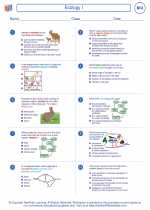
 Worksheet/Answer key
Worksheet/Answer key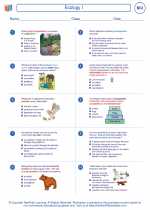
 Worksheet/Answer key
Worksheet/Answer key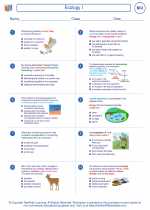
 Worksheet/Answer key
Worksheet/Answer key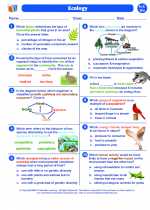
 Vocabulary/Answer key
Vocabulary/Answer key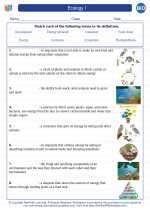
 Vocabulary/Answer key
Vocabulary/Answer key
